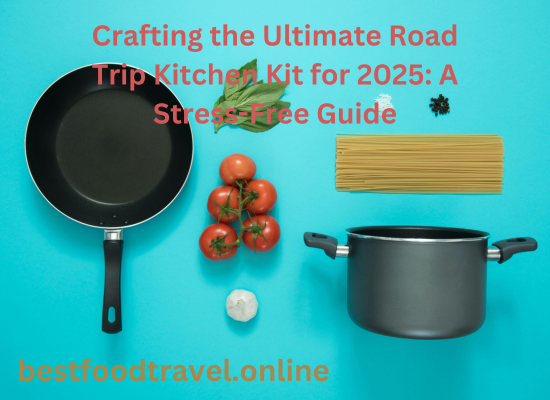Picture this: Last summer, on a family road trip, we packed a coffee maker but forgot the coffee. Cue a 30-minute detour to a gas station at 6 a.m. Sound familiar? Whether you’re a weekend camper or a full-time traveler, a well-organized road trip kitchen kit is the key to stress-free adventures. Let’s ditch the “oops, I forgot…” moments and create a kit that’s practical, portable, and a joy to use.

Why a Road Trip Kitchen Kit Matters in 2025
Road trips are booming—AAA reports that 80% of travelers now prefer driving vacations over flying. But here’s the catch: a 2024 Outdoor Industry Association study found that 63% of road trippers spend over $200 on last-minute meal stops due to poor planning. A well-prepared kitchen kit isn’t just about convenience; it’s a money-saving, stress-reducing game-changer.
Read more: Savor the Globe: Your No-Stress Guide to 2025’s Must-Attend Food Festivals
Take Sarah, a full-time RVer, for example: “Switching from random grocery bags to a dedicated kit cut my meal prep time in half. Plus, my kids stopped asking ‘Are we there yet?’ every time they got hungry.”
7 Common Road Trip Kitchen Kit Mistakes (and How to Avoid Them)
- Overpacking “Just In Case” Items
That avocado slicer? Leave it at home. Focus on multi-functional tools like a chef’s knife that can also spread condiments. Stick to the “3-in-1 rule”—each item should serve at least three purposes. - Neglecting Temperature Control
Ever had energy bars melt into a gooey mess? Invest in a high-performance cooler like the Yeti Tundra, which keeps ice for over five days, and use thermal bags for dry goods. - Forgetting Cleaning Supplies
Biodegradable wipes and a collapsible sink are lifesavers. Cleaning pans with limited water is no one’s idea of fun. - Skipping a Sharp Chef’s Knife
A reliable, sharp chef’s knife is a must for efficient meal prep. Many rental kitchens lack quality knives, so bring your own. - Omitting a Spice Kit
A compact spice kit can transform bland meals into gourmet delights. Use stackable mini jars filled with your favorite spices. - Overlooking Proper Storage Containers
Sturdy, collapsible bins are essential for keeping leftovers fresh and your space organized. - Ignoring Meal Planning
Without a plan, you’ll either overpack or forget essentials. Plan meals ahead, prep ingredients in advance, and pack accordingly to streamline cooking and reduce waste.
Read more: NYC’s Ultimate Food Guide 2025: Unforgettable Eats from a Local’s Perspective
Your Step-by-Step Guide to Road Trip Kitchen Success
Step 1: Build a “Kitchen Capsule”
Embrace minimalism with these essentials:
- Cookware: A cast iron skillet that doubles as a grill plate.
- Utensils: Silicone spatula, tongs, and a spork set.
- Storage: Reusable, space-saving bags like Stasher bags.
Step 2: Organize Like a Pro
Use stackable containers (like OXO’s nesting bowls) and a hanging organizer for spices. Label everything to avoid mix-ups.
Step 3: Master Meal Prep
Pre-chop veggies, marinate proteins in freezer bags, and freeze gallon jugs of water to double as ice packs.
Read more: Discover Cheap Food Travel Destinations (Without the Hassle)
conclusion
Building a road trip kitchen kit isn’t about packing everything—it’s about packing smart. Follow this guide to focus on what really matters: breathtaking sunsets, s’mores under the stars, and zero “hangry” moments. Ready to hit the road? Share your first campfire meal photo with me—I’ll be the one sipping perfectly brewed coffee!
FAQs
1. How do I keep bears away from my food?
To prevent bears from getting to your food, store all food items and scented products (like toiletries and lotions) in bear-proof containers or bear-resistant bags. Never leave snacks, trash, or food in your tent or car. Always follow local bear safety guidelines, particularly in national parks or bear-prone areas, to ensure both your safety and the animal’s well-being.
2. What’s the best compact stove for beginners?
For beginners, the Jetboil Flash is a top choice. It’s lightweight, user-friendly, and boils water in just 90 seconds, making it ideal for quick meals, soups, or that essential morning coffee. Its compact design and efficiency make it a must-have for any road trip kitchen kit.
3. How can I keep my food fresh without a fridge?
Invest in a high-performance cooler like the Yeti Tundra or RTIC, which can keep ice frozen for several days. Use frozen gallon jugs of water as ice packs—they’ll keep your food cold and provide drinking water as they melt. Store perishables in airtight containers and plan your meals to use fresh ingredients early in your trip.
Read more: Savor Europe: The Best Food Travel Destinations to Taste in 2025
4. What’s the best way to clean dishes on the road?
Pack biodegradable wipes, a collapsible sink, and eco-friendly dish soap for easy cleanup. Use minimal water to scrub dishes, and always dispose of wastewater responsibly—at least 200 feet away from natural water sources to protect the environment. This method keeps your kit lightweight and eco-conscious.
